
03 Sep Self Editing Books for Fiction Writers
How do you know when your novel is finished? Is it done when you type “The End” on the last page? I think not, and it would surprise me if anyone thought that to be the process. However, writer’s tend to think of themselves as writers and not editors. Funny that might be, but a good writer should be at least equal in his/her self editing skills. It comes with the territory.
It was Stephen King that coined it best in his book On Writing, that you need to put the manuscript away for some time. I’m sure Stephen’s intentions were for writer’s to have a sense of awareness regarding the story, and this same method of waiting can be applied to editing. By giving your brain time to forget, it almost becomes as if someone else had written the book altogether. Making it easier to edit.
Self Editing Is Hard
Editing is hard and tedious and boring but as a writer, it is also part of our job. I believe that every writer needs a professional editor to edit their finished books, but you have to make it look presentable at least, right? I’m not a writer, I’m a storyteller that uses words to tell stories; it’s the best format for that and it’s why I use it. Your outlook on editing should be the same. Just fake it until you make it… or just learn to love editing and your editor will love you in return.
Here are five Self Editing Books for Fiction Writers that you should be reading to get a jump start while your first draft sits tucked away.
Self Editing Books for Fiction Writers #1 Self Editing for Fiction Writers – Renni Browne & Dave King
“‘Self Editing for Fiction Writers’ has helped me understand why so many people get rejections from publishing houses. If these are the things that editors use to evaluate manuscripts, then it is in my best interest to know what they are and fix them in my stories before I submit to a publishing house editor.”
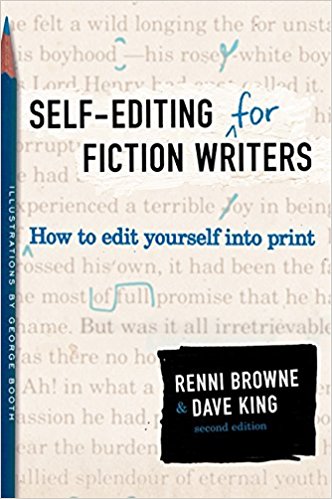 Book Summary: Hundreds of books have been written on the art of writing. Here at last is a book by two professional editors to teach writers the techniques of the editing trade that turn promising manuscripts into published novels and short stories.
Book Summary: Hundreds of books have been written on the art of writing. Here at last is a book by two professional editors to teach writers the techniques of the editing trade that turn promising manuscripts into published novels and short stories.
In this completely revised and updated second edition, Renni Browne and Dave King teach you, the writer, how to apply the editing techniques they have developed to your own work. Chapters on dialogue, exposition, point of view, interior monologue, and other techniques take you through the same processes an expert editor would go through to perfect your manuscript. Each point is illustrated with examples, many drawn from the hundreds of books Browne and King have edited.
Get Self-Editing for Fiction Writers
Self Editing Books for Fiction Writers #2. Proofreading Secrets of Best-Selling Authors –
“Proofreading Secrets of Best-Selling Authors is a “must have” for anyone who works with words. Whether you’re an editor, beta reader, aspiring writer, business professional, college student, or blogger, there’s something in this book that will help you.”
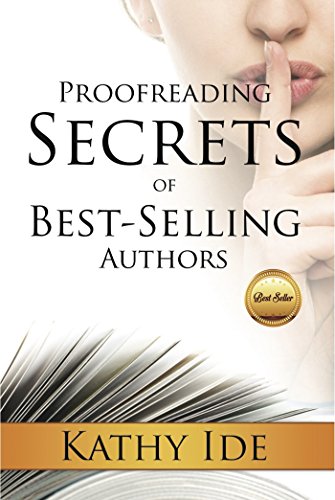 Book Summary: Learn how best-selling authors proofread their manuscripts to avoid typos, inconsistencies, inaccuracies, and errors in punctuation, usage, grammar, and spelling.
Book Summary: Learn how best-selling authors proofread their manuscripts to avoid typos, inconsistencies, inaccuracies, and errors in punctuation, usage, grammar, and spelling.
In Proofreading Secrets of Best-Selling Authors, Kathy Ide identifies the industry-standard references for books, magazines, and newspapers (which are different from the guidelines for other types of writing, such as college term papers). Using these official references, she highlights the most common mistakes writers make in the areas of punctuation, usage, grammar, and spelling (for which she uses the acronym PUGS). She also includes guidelines from The Christian Writer’s Manual of Style for authors and editors who work in the inspirational market.
Get Proofreading Secrets of Best-Selling Authors
Self Editing Books for Fiction Writers #3 Stein On Writing – Sol Stein
“Bought this after finishing a first draft of my first book. I now realize I have a lot of revisions to do, but I’m glad I read it. I was resisting editing my book due to a lack of direction, but this book helped me get over that resistance by giving me a manageable path to self-editing.”
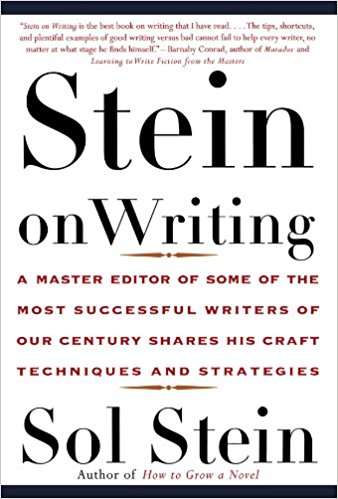 Book Summary: Stein on Writing provides immediately useful advice for all writers of fiction and nonfiction, whether they are newcomers or old hands, students or instructors, amateurs or professionals. As the always clear and direct Stein explains here, “This is not a book of theory. It is a book of usable solutions–how to fix writing that is flawed, how to improve writing that is good, how to create interesting writing in the first place.” With examples from bestsellers as well as from students’ drafts, Stein offers detailed sections on characterization, dialogue, pacing, flashbacks, trimming away flabby wording, the so-called “triage” method of revision, using the techniques of fiction to enliven nonfiction, and more.
Book Summary: Stein on Writing provides immediately useful advice for all writers of fiction and nonfiction, whether they are newcomers or old hands, students or instructors, amateurs or professionals. As the always clear and direct Stein explains here, “This is not a book of theory. It is a book of usable solutions–how to fix writing that is flawed, how to improve writing that is good, how to create interesting writing in the first place.” With examples from bestsellers as well as from students’ drafts, Stein offers detailed sections on characterization, dialogue, pacing, flashbacks, trimming away flabby wording, the so-called “triage” method of revision, using the techniques of fiction to enliven nonfiction, and more.
Self Editing Books for Fiction Writers #4 7 Cheat Sheets to Cut Editing Costs – Debra L. Butterfield
“If you’re a writer, you need to get this book. Filled with timely advice on how to edit your writing and make it tighter, clearer, and ready for the editor or publisher you’re sending it to.”
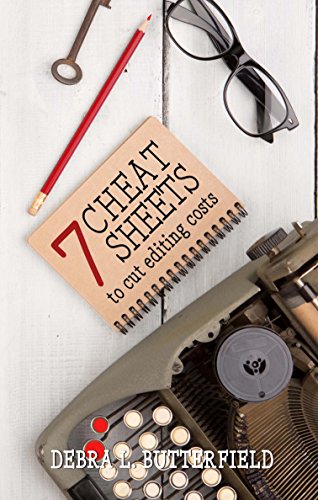 Book Summary: Take away the confusion of what to italicize or put in quotations, where to put those pesky commas, what showing is versus telling, and more.
Book Summary: Take away the confusion of what to italicize or put in quotations, where to put those pesky commas, what showing is versus telling, and more.
7 Cheat Sheets to Cut Editing Costs is a 64-page book chockful of advice that will help you create a cleaner, stronger manuscript, thus saving you money with your professional editor. Debra L. Butterfield discusses determining professional editing costs and the job of an editor. The seven cheat sheets include 15+ websites and search engines for research, point of view, show versus tell, formatting, punctuation guidelines, and more.
Get 7 Cheat Sheets to Cut Editing Costs
Self Editing Books for Fiction Writers #5 Common Mistakes Writers Make – Eva Marie Everson
“SUPER! Nothing short of a must have addition to any writer, new or seasoneds’, arsenal of writing helps. Eva Marie Everson breaks down those common writing boo-boos, simplifies them, describes them, and fixes them all in one swift sitting. Not owning this book is the worst mistake a writer can make. – Cindy Sproles, Exec. Editor, ChristianDevotions.us”
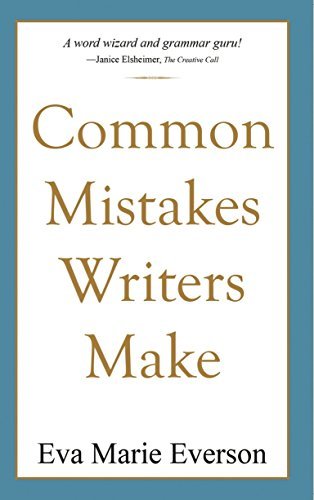 Book Summary: The first thing a reader or an editor — whether acquisitions or content — sees when they open your book to page one is your best effort at what you are trying to say. Fiction or nonfiction — doesn’t matter. If your writing is weak, sprinkled with grammatical errors, and plagued by shifting points of view, most readers and editors will not turn to page two. In this short book, best-selling and award-winning author Eva Marie Everson explains how to:
Book Summary: The first thing a reader or an editor — whether acquisitions or content — sees when they open your book to page one is your best effort at what you are trying to say. Fiction or nonfiction — doesn’t matter. If your writing is weak, sprinkled with grammatical errors, and plagued by shifting points of view, most readers and editors will not turn to page two. In this short book, best-selling and award-winning author Eva Marie Everson explains how to:
– Fix weak introductions – Find grammatical errors – Remove irrelevant details – Replace weak words – Understand and write to your target audience – Avoid big words – Create a sense of place – Avoid POV shifts – and much, much more.
Get Common Mistakes Writers Make






















